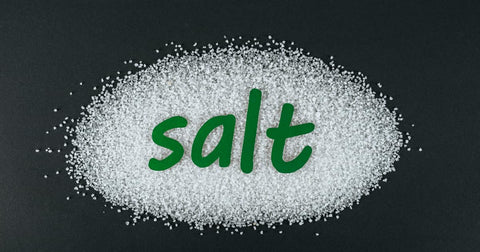Salt, or sodium chloride, is a fundamental mineral essential for various bodily functions. However, for some individuals, the relationship with salt can be more complex. You might be experiencing unusual symptoms and wondering, "Can you be allergic to salt?"

This article delves into the intricacies of sodium sensitivity, exploring whether a true salt allergy exists, common reactions to high-sodium intake, and how food intolerances might play a role in your digestive health.
Understanding Salt and Sodium
Before we tackle the question of salt allergy, let's clarify the terminology:
-
Salt: Refers to sodium chloride, the compound we use to season food.
-
Sodium: A mineral that's one component of salt.
When we talk about "salt allergy" or sensitivity, we're primarily concerned with reactions to sodium.
Can You Be Allergic to Salt? The Rare Reality
True salt allergies are incredibly rare. A genuine allergy involves an immune system response, where your body mistakenly identifies a substance as harmful. While sodium is essential for life, it's not typically the target of an allergic reaction.
What Happens in a True Salt Allergy?
A true salt allergy would involve a severe, immediate immune response, similar to reactions to peanuts or shellfish. This could include:

-
Hives or skin rash
-
Swelling of the face, lips, or tongue
-
Anaphylaxis (a life-threatening reaction)
These reactions are extremely uncommon with salt itself.
Can People Be Allergic to Salt? More Likely Sensitivities
While a true salt allergy is rare, some people experience adverse reactions to high sodium intake. This is more accurately described as a sodium sensitivity or intolerance, rather than a full-blown allergy.
Common Reactions to High Sodium:
-
Fluid Retention: Can lead to swelling, especially in the legs and feet.
-
Headaches: High sodium can contribute to headaches.
-
Increased Blood Pressure: A well-known consequence of excessive sodium intake.
-
Digestive Issues: In some cases, high sodium can worsen digestive discomfort.
Salt Allergy: Distinguishing from Other Conditions
It's important to differentiate between reactions to sodium and reactions to other components of salty foods. For example:

-
Food Additives: Processed foods high in sodium often contain additives that might trigger sensitivities.
-
Underlying Conditions: Certain medical conditions can cause symptoms that mimic a salt reaction.
Food Intolerance and Sodium Sensitivity: The Gut Connection
While sodium itself isn't the primary cause of food intolerance, it's worth noting the link between sodium intake, fluid balance, and gut health. Excessive sodium can disrupt the digestive process and contribute to:
-
Bloating: Fluid retention can lead to abdominal distention.
-
Constipation: Dehydration due to high sodium can harden stools.
-
Increased risk of gut inflammation: In some cases, high sodium diets might contribute to inflammation in the digestive tract.
Food Sensitivity Test Kit: Exploring Digestive Triggers
If you experience persistent digestive issues, even when managing your sodium intake, a food sensitivity test kit can help identify other potential triggers. You might have sensitivities to specific ingredients in salty foods, rather than the sodium itself.
Key Takeaways

-
True salt allergies are extremely rare.
-
Many people experience sensitivities to high sodium intake, leading to fluid retention and other symptoms.
-
Food intolerances can contribute to digestive issues, even if you're not specifically allergic to salt.
-
A food sensitivity test kit can help you pinpoint potential dietary triggers.
Disclaimer: This article is for informational purposes only and does not constitute medical advice. Consult a healthcare professional for diagnosis and treatment of any health condition.
Frequently Asked Questions:
1. What's the difference between a salt allergy and sodium sensitivity?
A true salt allergy would involve a severe immune response, similar to a peanut allergy, which is extremely rare. Sodium sensitivity is more common and refers to the body's heightened reaction to high sodium intake, leading to symptoms like fluid retention and increased blood pressure.
2. Can I become sensitive to salt over time?
While you can't develop a true allergy to sodium, your sensitivity to its effects can change. Factors like age, kidney function, and overall health can influence how your body handles sodium.
3. Are there any specific foods that are particularly high in sodium?
Yes, processed foods, fast food, canned soups, deli meats, and many condiments are notoriously high in sodium. Reading food labels carefully is crucial to monitor your intake.
4. Besides high blood pressure, what are some other signs that I might be consuming too much sodium?
Other signs of excessive sodium intake can include bloating, swelling in your hands or feet, increased thirst, and frequent urination.
5. If I'm experiencing digestive issues, could they be related to high sodium intake?
While high sodium intake isn't a primary cause of most digestive problems, it can contribute to fluid retention and bloating, which might worsen existing digestive discomfort. If you have persistent digestive issues, it's best to consult a doctor to rule out other causes and consider a food sensitivity test to identify potential dietary triggers.


.png?v=1737390083)
.png?v=1737187409)


